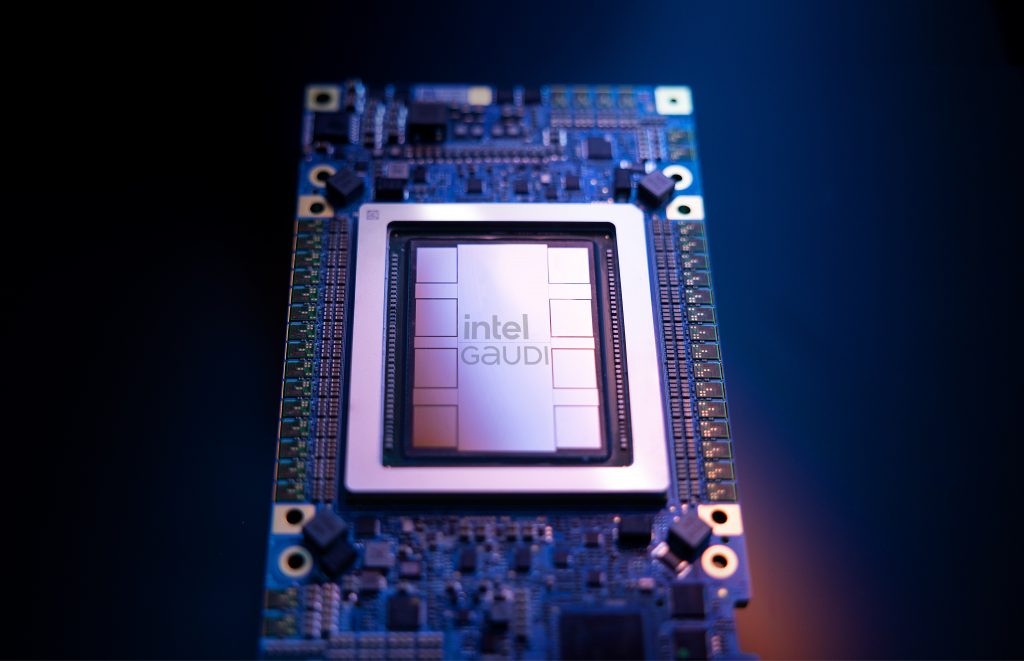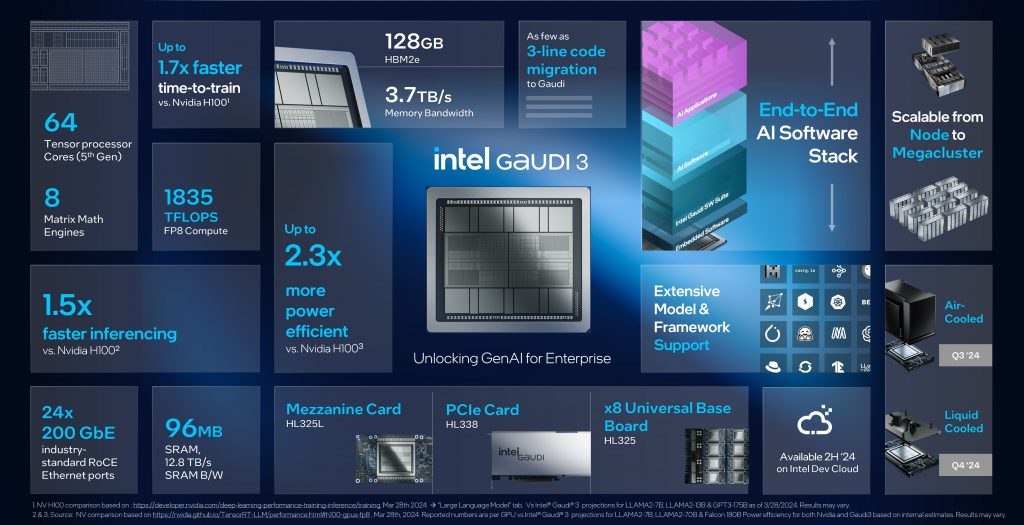Intel’s new Gaudi 3 accelerator, introduced at the Intel Vision 2024 conference, is set to make it easier for businesses to use AI, helping them overcome challenges and move from testing to full-scale use.

Intel, the American technology company, recently introduced the Intel Gaudi 3 accelerator and a suite of new open scalable systems at the Intel Vision 2024 customer and partner conference.
Intel CEO Pat Gelsinger delivered a keynote address at the event with other guests, where he talked about the future of enterprise Artificial Intelligence. He also discussed how AI represents a paradigm shift in how humans and technology interact. He also showed how Intel is at the forefront of expanding the possibilities of AI and creating world-changing technology.
According to an ML Insider survey by cnvrg.io, only 10% of enterprises successfully moved GenAI projects into production last year. Intel’s latest offerings address the challenges businesses face in scaling AI initiatives.
“Innovation is advancing at an unprecedented pace, all enabled by silicon – and every company is quickly becoming an AI company,” said Intel CEO Pat Gelsinger at the event.
“Intel is bringing AI everywhere across the enterprise, from the PC to the data center to the edge. Our latest Gaudi, Xeon and Core Ultra platforms are delivering a cohesive set of flexible solutions tailored to meet the changing needs of our customers and partners and capitalize on the immense opportunities ahead,” he added.
What is Gaudi 3

Enterprises are looking to scale GenAI from pilot to production. To do so, they need readily available solutions built on performant, cost-efficient, and energy-efficient processors like the Intel Gaudi 3 AI accelerator, which also addresses complexity, fragmentation, data security, and compliance requirements.
The new Intel Gaudi 3 is an AI accelerator that, according to Intel, delivers four times AI computing power, twice the networking bandwidth, and a 1.5x increase in memory bandwidth compared to Intel’s previous BF16. Intel is said to power AI systems with up to tens of thousands of accelerators connected through the common Ethernet standard, also benefiting in AI training and inference.
Justin Hotard, Intel executive vice president and general manager of the Data Center and AI Group, commented on how Gaudi 3 expects to decrease the gap between the enterprises and AI, “In the ever-evolving landscape of the AI market, a significant gap persists in the current offerings. Feedback from our customers and the broader market underscores a desire for increased choice.”
“Enterprises weigh considerations such as availability, scalability, performance, cost, and energy efficiency. Intel Gaudi 3 stands out as the GenAI alternative, presenting a compelling combination of price performance, system scalability, and time-to-value advantage,” he added.
AI solutions for enterprises
Here are a few examples of how different enterprises spanning various industries are using or planning to use Intel’s Gaudi accelerator according to Intel:
Development of Large Language Models (LLMs):
* NAVER aims to develop powerful LLMs for advanced AI services globally, leveraging Intel Gaudi’s capabilities.
* Ola/Krutrim is pre-training foundational models with generative capabilities in multiple languages using Intel Gaudi.
Manufacturing and Industry Solutions:
* Bosch explores smart manufacturing opportunities, including generating synthetic datasets for anomaly detection.
* IFF utilizes AI and digital twin technology for advanced enzyme design and fermentation process optimization.
Cloud Services and Computing Infrastructure:
* CtrlS Group collaborates to build an AI supercomputer for India-based customers, scaling cloud services with Intel Gaudi clusters.
Telecommunications and Customer Experience:
* Bharti Airtel plans to enhance its AI capabilities using Intel’s technology to improve customer experiences.
Data Analytics and Consulting Services:
* NielsenIQ enhances its GenAI capabilities by training domain-specific LLMs on consumer behavior data.
* Infosys collaborates with Intel to bring AI technologies to its digital services and consulting, including AI accelerators and processors.
Computer Vision and AI Platforms:
* Seekr runs production workloads for LLM development and deployment support using Intel Gaudi, GPUs, and Xeon processors.
* Roboflow utilizes Intel’s AI tools to run computer vision models on its platform.
Healthcare and Biotechnology:
* Landing AI fine-tunes large vision models for medical applications such as cell segmentation and cancer detection.
Intel also partnered with Google Cloud, Thales, and Cohesity to use Intel’s confidential computing capabilities in their cloud instances, which includes Intel’s Trust Domain Extensions, Software Guard Extensions, and attestation service.
The company plans to make Gaudi 3 available to enterprises like Dell, HP, Lenovo, and Supermicro in the second quarter of 2024.
Also read: Nvidia pushes AI adoption among enterprises
Gaudi 3 or Nvidia H100
Chipmaker giant Nvidia too made news with the recent announcement of their Project GR00T, or Generalist Robot 00 Technology, as a versatile model for humanoid robots to advance robotics and AI development.
Nvidia’s GenAI microservices are being used or are to be used by several companies for various innovative applications across different industries. Leading application, data, and cybersecurity platform providers such as Adobe, Cadence, CrowdStrike, Getty Images, SAP, ServiceNow, and Shutterstock are among the first to utilize the new NVIDIA generative AI microservices offered in NVIDIA AI Enterprise 5.0.
In comparison Intel’s Gaudi 3 is expected to be faster than Nvidia’s H100 for training and processing AI models. It’s built with advanced technology, more memory, and better networking capabilities. Gaudi 3 also outperforms H100 in terms of inference throughput and power efficiency, though it lacks some features found in Nvidia that could make it even faster for certain tasks.
In conclusion, Intel’s unveiling of the Gaudi 3 accelerator and suite of scalable systems marks a significant step in advancing AI adoption across enterprises. With AI rapidly becoming the norm in the ever evolving digital landscape, companies like Intel and Nvidia are helping the enterprises by addressing challenges related to performance, scalability, security and compliance.
Image Source: Intel Corporation
